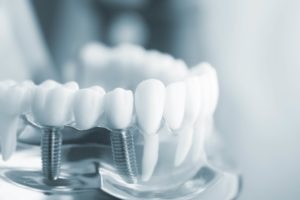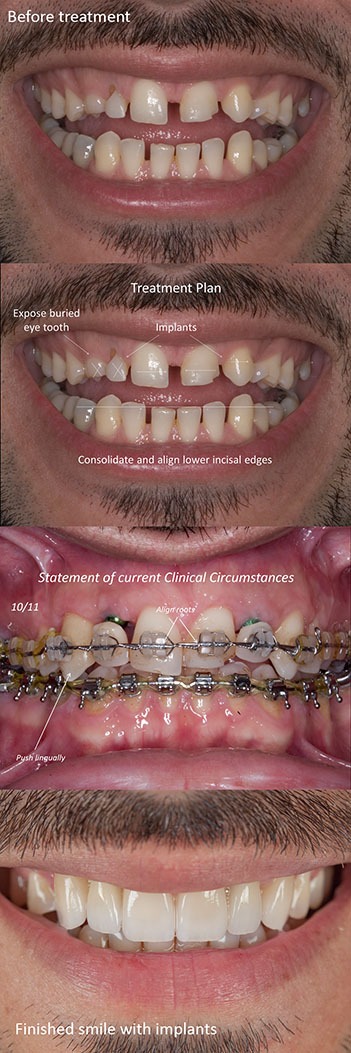
For patients who’ve suffered tooth loss, there are many benefits to dental implants. Dentists often recommend replacing lost teeth with an appropriate number of these titanium posts or fixtures. One of the most significant reasons why is because implant posts are the only way to replace the roots of your lost teeth, which used to rest within your jawbone. By doing so, they come closer than any other dental prosthesis to mimicking your healthy, natural tooth structure. Along with significantly improved support for your dental crown, bridge, or denture, this also means dental implants can provide a plethora of other benefits, especially when it comes to the comfort and support of your replacement teeth.
Facial collapse is a condition caused by bone loss in the jaws. When the jawbone degenerates due to bone resorption, the facial muscles pull back from their original position. The condition occurs in patients with missing teeth and is also a problem for people with conventional dentures. Removable dentures encourage this bone loss, while another prosthetic option, implant retained dentures, can protect against facial collapse.

This smile transformation included two implants to replace his lateral incisors
The most important benefits of dental implants
Titanium fixtures can replace lost teeth
Most people imagine implants as a replacement option for a single missing tooth. In fact, a skilled restorative dentist can top a titanium post with a number of teeth. Implant secured dentures and implant secured bridges help restore a patient’s ability to speak, eat, and smile with confidence. Implant supported crowns will feel and function just like real teeth.
Prevention of bone loss is one of the most important benefits of dental implant treatment
Your tooth roots exert force within the jawbone every time you bite down on something. This force stimulates the bone tissue, keeping it dense and healthy. When you lose a tooth, you also lose that source of stimulation and the jawbone begins to thin out and weaken. Since implants replace the root portions of a tooth, they help keep your jawbone healthy. In fact, because you can bite down firmly, it will stimulate more bone growth.
Bone resorption occurs after a tooth is extracted because the bone no longer serves a purpose. Once a tooth root is missing, the supporting bone around the tooth shrinks back. This process is relatively fast if teeth are missing in the front of the mouth because the bone is thin. People often replace missing front teeth with a bridge.
A bridge does not actually replace the root of the tooth. This causes aesthetic issues as the bone reabsorbs and the gums collapse, causing the false tooth to look less natural. A dental implant actually replaces the root of a missing tooth and preserves bone, thus keeping the natural aesthetic of your chosen prosthetic restoration.
Teeth implants are worth it just because they prevent facial collapse
In cases where multiple teeth are missing, bone resorption can cause serious issues with tooth and jaw alignment. When all of the teeth in the back of the mouth are missing, bone resorption will lead the remaining gum tissue to collapse. The front teeth will flare out as a result and the corners of the mouth will droop. The jaw bone deteriorates rapidly, muscles pull back from their original position, the lips sag due to lack of support, and wrinkles increase. The facial appearance can change dramatically. Some prefer to replace their back teeth with a partial denture. This actually encourages bone loss because of the pressure exerted on the gums while you chew.
A benefit of dental implant placement is that it eliminates bone loss by replacing missing teeth. The facial structure is then maintained.
Another benefit of dental implants is that they last longer than other prosthetics
Traditional tooth supported bridges need to be replaced on average every 8-10 years. Dentures need replacing every 5-10 years at most. One of the biggest benefits of dental implants is that they can last as long as 30 years or more.
No need to modify healthy adjacent teeth
It is common to look at the benefits of a dental implant vs a bridge. Traditionally, replacing a lost tooth meant having a dental bridge custom designed and placed to fill the gap in your smile. Though durable and highly lifelike in appearance, a bridge relies on the support of the healthy teeth that remain closest to the gap. To support it, the teeth must be modified to accommodate the crowns on either side of the replacement tooth.
A benefit of dental implants is your dentist can place a lifelike crown on top of the prosthetic root. This eliminates the need to alter your healthy teeth and makes it easier to brush and floss.
No need to rely on clasps and/or messy adhesives
Patients who’ve lost several or all of their teeth on the upper and/or lower dental ridges have long depended on partial and complete dentures to rebuild their smiles. Like dental bridges, modern dentures are designed to closely match your natural teeth in appearance. Unfortunately, they lack the support of root like anchors. By contrast, implant supported dentures provide high quality smile restoration with the added benefits of implanted, prosthetic roots so you can avoid the need for clasps and/or adhesives to hold your new teeth in place.
Learn More About the Quality of Life Benefits of Dental Implants
Within the last 20 years, titanium fixtures have become the tooth replacement option of choice among dentists and patients. Comprised of small, screw-like devices that an oral surgeon literally implants into your jaw. They are made from biocompatible titanium and enjoy a very high success rate. While you may have read about the extra security and stability that they offer, you may be surprised at what else implants can do for your overall health and well being.
After losing one or more teeth, implants may be the most beneficial way of replacing them, especially for your long term oral health. To learn if you might be a candidate for dental implants, schedule a consultation by calling us at 847-234-0517. We also proudly serve residents of Chicago and all surrounding communities in the Chicago Metro area.
